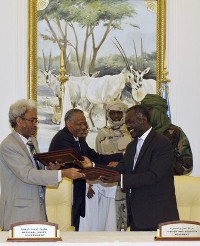UN Security Council endorses stalled Darfur peace process
March 26, 2009 (NEW YORK) – The UN Security Council announced support for a stalled peace process only a week after the only rebel party involved rebuffed the talks and a day after their leader slammed the Sudan government for a “blatant breach” of the preparatory goodwill agreement signed last month in Doha ahead of the once anticipated negotiations.

JEM Chairman Khalil Ibrahim yesterday called on the UN Security Council to implement a no-fly zone over Darfur, seize control of government oil revenues as part of an oil-for-food programme and take measures to ensure the flow of humanitarian aid.
Nevertheless, following a briefing by Joint Chief Mediator Djibril Bassolé, the AU-UN dignitary tasked with negotiating a peace settlement for Darfur, Libyan Ambassador Abdurrahman Mohamed Shalgham voiced support for the process.
Shalgham, who spoke in his capacity as current president of the Security Council, said that “The members of the Security Council expressed their firm support to Mr. Bassolé to implement his mandate. The members of the Security council stressed the importance of continuing the peace process and urged the parties to engage actively in the negotiations.”
In informal comments to the press, the chairman of the UN Security Council said in Arabic that according to Bassolé two issues complicate the ongoing peace efforts: the Sudan-Chad relations and the International Criminal Court (ICC) decision which prompted the rebel groups to raise the level of their demands; some rebels object to the recent aid expulsions but others reject the talks categorically, saying Bashir is not legitimate.
Abdel Wahid Al-Nur, one rebel leader implicitly referred to by the Libyan diplomat, has proposed the formation of a large national government formed from Sudanese democratic forces and led by his movement.
Another diplomat who attended the consultations, French Permanent Representative Jean-Maurice Ripert, likewise emphasized the importance of the apparently defunct political process. Questioned about Al-Nur, who lives in France, he remarked that his government is constantly pressuring the Darfur rebel chief to join the talks.
He further disclosed that John Holmes, the UN Emergency Relief Coordinator, also gave a briefing this morning. Ripert also took note of Libyan involvement in mediating the turbulent relations between Sudan and Chad, where JEM has critical supply lines, saying that Libya continues efforts to unite certain rebel factions.
“So there was a lot of tribute that was paid to Libya and to the action of Libya,” he revealed about the closed-doors session.
Reportedly, Bassolé also used his audience before the Council to reiterate the African Union recommendation to suspend the indictment of President Al-Bashir. Under the terms of the Rome Statute, the UN Security Council is empowered to suspend the International Criminal Court arrest warrant against Bashir for a renewable period of 12 months.
The French Permanent Representative, however, downplayed the deferral request saying that the Council would “take it duly into account” but then immediately noted that the French position is that the judicial process should go on.
“We think that for the moment there is no reason to accept any Article 16 solution,” said the diplomat, referring to the Rome Statute.
US Permanent Representative Susan Rice did not appear during the events because she was on vacation, according to a diplomat in New York.
But Sudanese Ambassador Abdalmahmood Abdalhaleem Mohamad discussed the briefing with reporters after the consultations, despite not having been permitted to attend. He said the format of the morning session was “a little bit disturbing” because the session was held behind closed doors.
“Everybody is looking to listen to what Bassolé has achieved throughout the past months and year,” said Mohamed. “Maybe some members would not like to give supremacy to the peace process.”
He also explained that “the humanitarian situation is very much under control,” citing a new report from a humanitarian assessment mission in Darfur conducted jointly by the Government of Sudan and the United Nations.
Undertaken after the expulsion of 16 aid groups, the assessment mission concluded in its report Monday that 1.1 million Darfuri will go hungry as of May 1, 2009 unless World Food Programme finds new and capable partners to implement distributions.
WFP requires partners with “sufficient experience in food security assessment, beneficiary verification and registration, food management, logistics management, monitoring and reporting,” according to the report. While Sudanese officials have proposed national aid groups to replace the ousted international ones, the top UN aid official has rejected to partner with these groups.
In an interview last week, Bassolé criticized the Sudanese government’s decision to expel the aid groups. He told Sudan Tribune in Paris, “maintaining the displaced population in the camps under these conditions, it is not the best solution.”
(ST)
